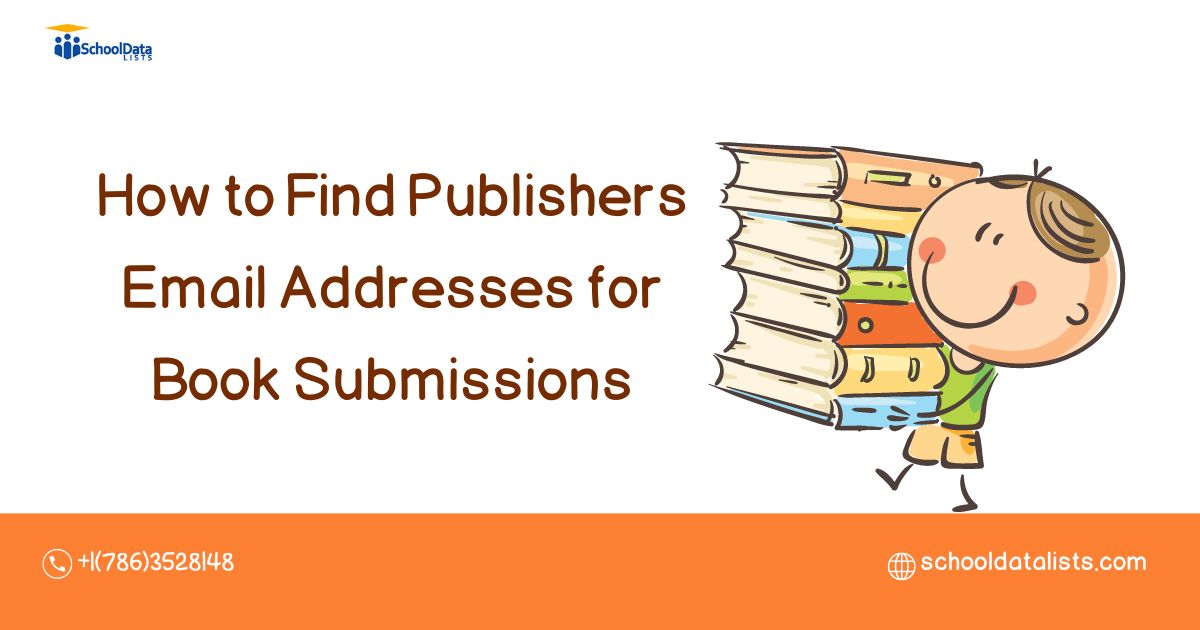How to Find Publishers Email Addresses for Book Submissions

Finding publishers email addresses for book submissions can be a daunting task for many aspiring authors. Whether you’re a first-time author or a seasoned writer looking to switch publishers, getting your manuscript in front of the right person is crucial. In today’s digital age, most book publishers prefer or require submissions through email, making it imperative to find accurate and up-to-date contact information. In this comprehensive guide, we will explore various strategies to help you find the publishers email addresses for book publishing, ensuring your next book submission lands in the right inbox.
Discover Email Addresses Through Research
Embarking on the journey to locate publishers’ email addresses begins with diligent research. Initiate your search with targeted Google queries that align with your manuscript’s niche, for example, “science fiction book publishers email contact”. Such searches often lead to directories or compilations maintained by literary organizations, agents, or fellow authors, which can serve as a treasure trove of pertinent contact details. Additionally, engaging in thorough research on platforms like LinkedIn can unearth valuable information about publishers and their preferred contact methods. It’s crucial to cross-reference the email addresses you find to ensure their validity, as the publishing landscape is dynamic, and contact information may evolve. Delving into online communities or groups dedicated to writing and publishing can also yield unpublished or harder-to-find contact information, courtesy of shared experiences and tips from other writers navigating the same path. This proactive research strategy not only aids in gathering email addresses but also in understanding the submission preferences of various publishers, positioning your manuscript for a more targeted and informed submission process.
Utilize Writers’ Market Resources
For authors on the hunt for book publishers’ contact details, the Writers’ Market stands out as a quintessential tool. It annually compiles an extensive array of publishing opportunities, from book deals to magazine submissions, complete with email addresses and detailed submission guidelines. What makes the Writers’ Market particularly invaluable is its commitment to currency; the online edition undergoes regular updates, ensuring that the contact information it provides remains relevant and actionable. This resource effectively bridges the gap between aspiring authors and potential publishers by streamlining the search for accurate email contacts. By tapping into this rich repository, writers can significantly enhance their submission strategy, targeting their queries with precision and confidence. The Writers’ Market not only simplifies the search process but also educates writers on the specifics of submission guidelines, a critical aspect of making successful pitches to publishers.
Explore Publishers’ Websites
Navigating directly to publishers’ websites remains a highly effective strategy in pinpointing email addresses for submissions. These digital platforms frequently host dedicated sections such as “Submissions” or “Contact Us,” which meticulously outline the procedure for submitting your manuscript. It’s imperative to scrutinize the guidelines provided, as publishers often designate unique email contacts for distinct genres or submission types, reflecting their organizational structure and editorial preferences. This method ensures you’re adhering to their specific requests, potentially increasing the likelihood of your manuscript undergoing review. Furthermore, publishers’ websites might offer insights into their publishing philosophy, current needs, and any thematic calls for submissions, allowing you to tailor your proposal accordingly. Engaging with this firsthand information equips you with a deeper understanding of the publisher’s expectations, thereby fine-tuning your submission to align more closely with their criteria.
Network at Writing Conferences and Workshops
Attending writing conferences and workshops opens doors to firsthand interactions with key figures in the publishing world. These events are fertile ground for networking, offering direct access to publishers, editors, and agents who are pivotal in the book publishing process. When you find yourself in these environments, make it a priority to participate actively in discussions, panels, and networking breaks. This proactive approach not only allows you to gain insights into current industry trends but also positions you to ask for email addresses in a more personal and memorable manner. Use these occasions to introduce your work briefly and inquire about the best way to submit your manuscript. Often, the casual, face-to-face interaction can leave a lasting impression, making your subsequent email submission more recognizable. Remember, the goal is to establish meaningful connections that could lead to valuable advice or even direct submission opportunities. Approach these interactions with professionalism and preparedness, armed with business cards and a concise pitch of your manuscript, to make the most of these invaluable networking opportunities.
Leverage Social Media and Online Forums
Social media platforms and online forums offer dynamic spaces for networking with the literary community. Platforms like LinkedIn and Twitter, along with dedicated writing forums, provide a unique opportunity to connect directly with publishing professionals, including editors, publishers, and experienced authors. These digital communities are not only platforms for discussion but also serve as valuable resources for sharing and obtaining contact information. Joining groups or forums focused on writing and publishing can lead to discoveries of curated lists of publishers’ email addresses, often shared by members who have navigated the submission process successfully. Engage actively in these communities by asking questions, participating in discussions, and offering help when you can. This active participation not only increases your visibility but can also lead to direct recommendations and tips on contacting publishers. Always approach these interactions with professionalism and a willingness to contribute positively to the community, as the relationships formed here can be instrumental in advancing your publishing goals.
Consider Using Email Finder Tools
In the modern quest to connect with book publishers, email finder tools have emerged as an innovative solution. These digital utilities, such as Hunter.io or Voila Norbert, function by identifying email patterns associated with specific domain names, offering a new avenue for discovering the contact information of publishing houses. Although traditionally leveraged in business sectors like sales and marketing, these tools are surprisingly applicable for authors aiming to pinpoint the right inboxes for their manuscript submissions. When embarking on this route, it’s imperative to approach with a level of discretion, ensuring that the utilization of these tools aligns with ethical practices and respects the privacy protocols of potential publishers. Additionally, authors should be cognizant of each publisher’s submission guidelines to confirm whether unsolicited contacts are permissible. This method should complement, not replace, the more traditional approaches of direct research and networking, serving as an auxiliary strategy in the broader endeavor of securing a publisher for your work.
Check Literary Agent Listings
Exploring literary agent listings can be an indirect yet effective strategy to uncover the email addresses of book publishers. These listings often contain not just the agents’ contact information, but occasionally, they also share details about publishers with whom they’ve successfully worked. This method is particularly useful for authors contemplating the agent route, providing dual benefits. While the primary goal might be to engage an agent who can champion your work, these listings can simultaneously offer insights into potential publishers, including those who might be a good fit for your manuscript. It’s important, however, to navigate this approach with an understanding that some publishers may exclusively deal with submissions through agents. Therefore, ensuring that your exploration aligns with the submission policies of the publishers you’re interested in is crucial. This approach, while somewhat indirect, can serve as a valuable complement to your broader strategy of connecting with the right publishing house for your book.
The Power of Persistence
Embarking on the journey to get your manuscript noticed and accepted by a publisher is filled with challenges, and encountering rejection is a common hurdle. However, the key to navigating this part of your authorial journey lies in steadfast persistence. Each rejection should be viewed not as a setback, but as an invaluable learning experience that edifies your approach to future submissions. It’s essential to continuously refine your manuscript, drawing on feedback where available, and to remain committed to your search for the right publisher. This dedication to improvement and resilience in the face of rejection is what ultimately paves the way for success. Engage actively in honing your craft and understanding the nuances of the publishing world, as this knowledge can significantly inform and enhance your submission strategies. Remember, with every attempt, you’re not only getting closer to finding a publisher but also to becoming a more polished and savvy writer.
Conclusion
Navigating the process of submitting your manuscript to publishers is multifaceted, involving comprehensive research, networking, and a strategic approach to resource utilization. By employing a variety of methods, from conducting targeted searches and tapping into writers’ market databases to actively participating in writing events and fostering online community connections, you stand a better chance of placing your work in front of the right eyes. The publishing arena is diverse, offering numerous paths for writers to get their work published. Consistency and a proactive stance in seeking out and utilizing publishers email addresses can significantly bolster your efforts. As you venture through this process, remember that each step taken is a move toward achieving your publishing aspirations. With a combination of persistence, strategic action, and a touch of fortune, securing a partnership with a suitable publisher for your manuscript is within reach.






